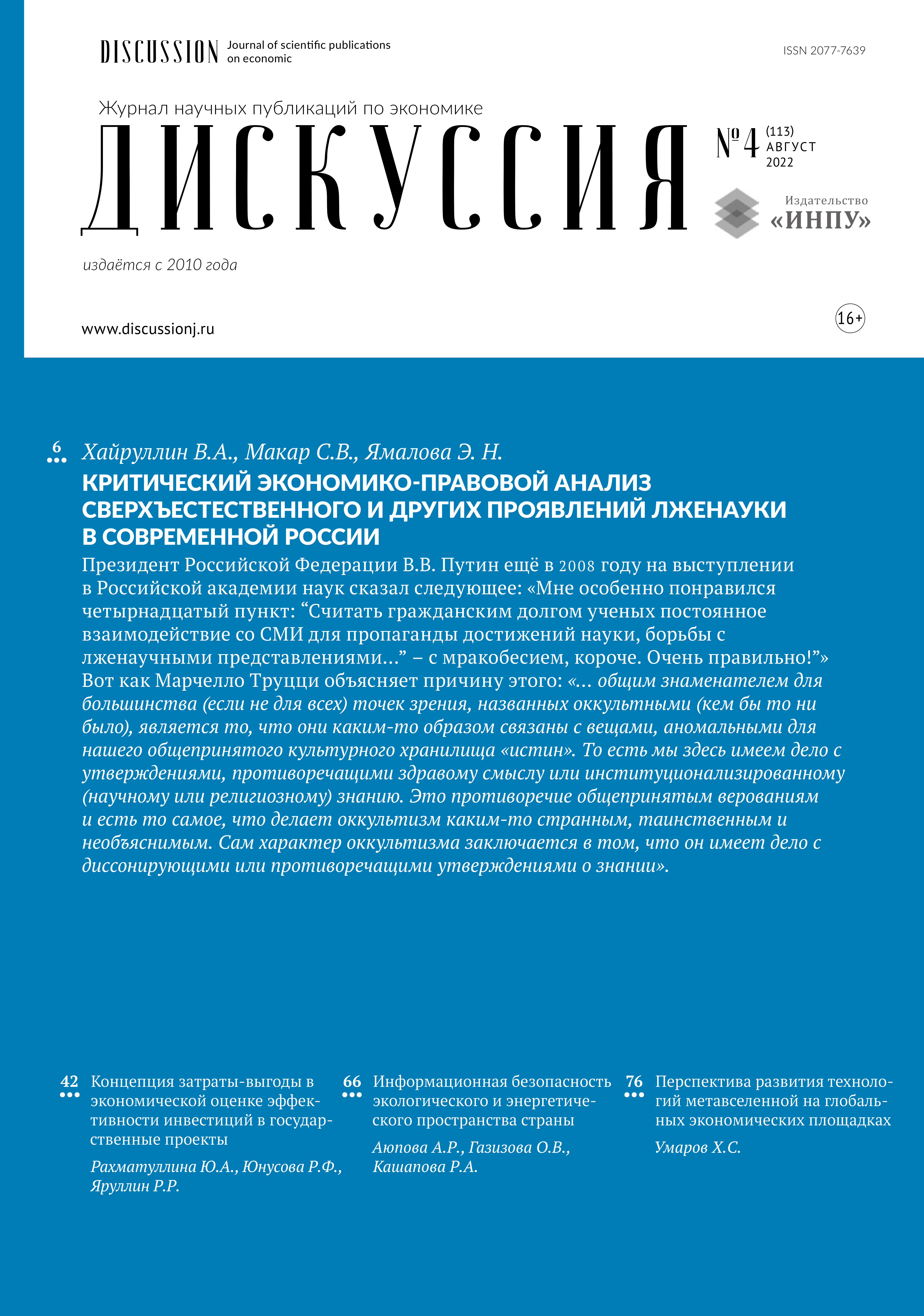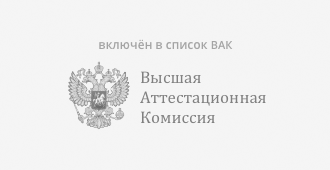CRITICAL ECONOMIC AND LEGAL ANALYSIS OF THE SUPERNATURAL AND OTHER MANIFESTATIONS OF PSEUDOSCIENCE IN MODERN RUSSIA
Keywords:
economics, shadow economy, occultism, pseudoscience, magic, fraud, taxes, bill, anti-scienceAbstract
"Of course, the described situation is the result of a lag in public consciousness, which has not yet absorbed the understanding of the role of science and the scientific and technological revolution in modern life. This cannot continue, it should not, and the mass media should take care of the introduction and promotion of knowledge, and not be led by any charlatans"
(Academician of the Russian Academy of Sciences Ginzburg V.L., Izvestia newspaper No. 45 of February 21, 1991)
The quote of Academician of the Russian Academy of Sciences V.L. Ginzburg, given above, like no other fully reflects the content of this study. The practice of introducing into the mass consciousness the existence of "supernatural" forces, mysticism, occultism, magic, extrasensory perception, astrology and other manifestations of public delusions and ignorance, as well as individual ideas, more looking like delirium, has reached unprecedented proportions in modern Russia. The market for such services is estimated at billions of dollars (we will show this later in the study). An absolutely uncontrolled shadow area of activity of the so-called "supernatural" contributes to the enrichment of fraudsters, charlatans, subjects who often have obvious mental abnormalities, not only is it not prohibited, but it is not regulated in its economic and legal basis. Most often we can see propaganda and advertising of such activities and services in the mass media. The State Duma of the Russian Federation consistently rejects all draft laws aimed at regulating and controlling this area of human activity, citing the lack of definitions, formulations and grounds (we will present the grounds for this statement later in the study). In this study, the authors will try to close the existing gaps, to give definitions of concepts, to distinguish the categorical-conceptual domain, based on the real facts of reality and generally recognized scientific methods of cognition. The object of the study is the economic and legal space of distorted mass consciousness. The subject of the study is the destructive artistic and creative activity of social groups and individuals. The purpose of the study is to substantiate the role of science and scientific methods of cognition of reality for society and citizens of the country. The objectives of the study in general consist of a reasoned assessment of the destructive consequences for the development of society in the absence of control and regulation of destructive manifestations of social and social existence by the state. The main part of the study consists of several large interconnected sections. The first one examines the world experience of economic and legal regulation and control of the said subject area of research. In the second section of the study, we assess the current state of the issue in Russia, affecting the areas of education and public health. The following section presents the author's definitions and delineations of the categorical and conceptual subject area of research with real reasoned proposals to correct the current situation. The authors of this study do not build a completely individual author's chain of argumentation and evaluation of phenomena. To a greater extent, the arguments and evaluation are based on the results of the remarkable work of Russian scientists, popularizers of science and patriots of their country: Academician V.L. Ginzburg, Academician Y. S. Osipov, Academician E. P. Kruglyakov and other equally worthy representatives of the academic environment and public figures of our country.
Downloads
Metrics
References
Гинзбург В.Л. О науке, о себе и о других. - 3-е изд., доп. М.: Физматлит, 2003. 544 с.
Кругляков Э.П.“Ученые” с большой дороги-3 /Э.П. Кругляков; Комиссия по борьбе с лженаукой и фальсификацией науч. исслед. РАН. М.:Наука, 2009. 357 с. ISBN 978-5-02-037043-2.
Truzzi M. Definition and dimensions of the occult: towards a sociological perspective //The Journal of Popular Culture. 1971. Т. 5. № 3. С. 635-646. DOI: 10.1111/j.0022-3840.1971.0503_635.x.
Rogers C.R. A Theory of Therapy, Personality, and Interpersonal Relationships: As Developed in the Client-Centered Framework. In S. Koch (Ed.), Psychology: A Study of a Science. Formulations of the Person and the Social Context. 1959. Vol. 3. С. 184-256. New York: McGraw Hill.
Truzzi M. The occult revival as popular culture: Some random observations on the old and the nouveau witch //The Sociological Quarterly. 1972. Т. 13. №. 1. С. 16-36. DOI: 10.1111/j.1533-8525.1972.tb02101.x.
Bainbridge W.S., Stark R. Cult formation: Three compatible models //Sociological Analysis. 1979. Т. 40. № 4. С. 283-295.DOI: 10.2307/3709958.
Eister A.W. An outline of a structural theory of cults //Journal for the Scientific Study of Religion. 1972. С. 319-333. DOI: 10.2307/1384673.
Jorgensen D.L., Jorgensen L. Social meanings of the occult //Sociological Quarterly. 1982. Т. 23. № 3. С. 373-389. DOI: 10.1111/j.1533-8525.1982.tb01019.x.
Mori J. Magic and Fate in Eighteenth-Century London: Prosecutions for Fortune-Telling, c. 1678–1830 //Folklore. 2018. Т. 129. № 3. С. 254-277. DOI: 10.1080/0015587X.2018.1426688.
Vyshka G., Simoni S. Magic and forensic psychiatry: A case study and review of the literature //World Journal of Meta-Analysis. 2021. Т. 9. № 1. С. 45-50. DOI: 10.13105/wjma.v9.i1.45.
Bok B.J., Jerome L.E. Objections to astrology. Buffalo, NY: Prometheus books, 1975.С. 1-2.
Kurtz P. The new skepticism: Inquiry and reliable knowledge. 1992.
Kurtz P. The Transcendental Temptation: A Critique of Religion and the Paranormal. PrometheusBooks, 2013.516 с.
Леви-БрюльЛ. Сверхъестественноевпервобытноммышлении, Москва: Педагогика-Пресс, 1994//Пер. сфранц.[Ljus’ enLevi-Brjul’, Sverh”estestvennoevpervobytnommyšlenii, Moskva: PedagogikaPress, 1994.Per. sfranc.]. 1999.
Седов Л.И. Размышления о науке и об ученых. Академия наук СССР, М.: Наука, 1980.440 с.
Arnett J.J. Broad and narrow socialization: The family in the context of a cultural theory //Journal of Marriage and the Family. 1995. С. 617-628.
Day, Nicholas "Parental ethnotheories and how parents in America differ from parents everywhere else". Slate. Retrieved 19 April 2013.[Электронный ресурс]. Режим доступа:http://www.slate.com/blogs/how_babies_work/2013/04/10/parental_ethnotheories_and_how_parents_in_america_differ_from_parents_everywhere.html?via=gdpr-consent (дата обращения: 29.08.2022).
Harkness S., Super C.M. (ed.). Parents' cultural belief systems: Their origins, expressions, and consequences. Guilford Press, 1996. 558 с.ISBN1572300310, 9781572300316.
ЛейбницГ.В. (1646-1716). Монадология /Г.В. Лейбниц; [переводсфранцузскогоВ.П. Преображенского, Ю.П. Бартнева]. Москва: РИПОЛклассик, 2018. 197 с., ISBN 978-5-386-10561-7.
Underhill E. Mysticism. DigiCat, 2022. 565 с.
Блаватская Е.П. (1831-1891). Тайная доктрина. Москва: Прогресс: Сирин, 1991-1992. Т. 1, кн. 1- 1991. 369 с.; ISBN 5-01-003675-4.
Bliese P.D., Halverson R.R. Group Consensus and Psychological Well-Being: A Large Field Study 1 //Journal of Applied Social Psychology. 1998. Т. 28. № 7. С. 563-580. DOI: 10.1111/j.1559-1816.1998.tb01720.x.
Маркс К., Энгельс Ф., Ленин В.И. О морали и нравственном воспитании. М.: Политиздат, 1985.528 с.
Костандов Э.А. Психофизиология сознания и бессознательного, СПб: «Питер», 2004.
Пашковский В.Э. Психические расстройства с религиозно-мистическими переживаниями: Краткое руководство для врачей / В.Э. Пашковский. Санкт-Петербург: Издательский дом СПбМАПО, 2006. 144 с. ISBN 5-98037-058-7. EDN TWCSJT.
Пашковский В.Э. Клинические аспекты бреда колдовства / В.Э. Пашковский // Журнал неврологии и психиатрии им. C.C. Корсакова. 2005. Т. 105. № 3. С. 7-11. EDN HRWWFL.
Экстрасенсы калечат душу и тело. [Электронный ресурс]. Режим доступа:https://scorcher.ru/art/mist/extrasensory/extrasensory12.php (дата обращения: 22.09.2022).
Захарцев С.И. Некоторые проблемы теории и философии права / С.И. Захарцев. Москва: Юридическое издательство "Норма", 2014. 208 с.ISBN 978-5-91768-491-8. EDN SJHQIB.
Новоселов М.М. Абстракция множества и парадокс Рассела /М.М. Новоселов // Вопросы философии. 2003. № 7. С. 67-77. EDN OOAUSX.
Вацлавик П. Прагматика человеческих коммуникаций: Изучение паттернов, патологий и парадоксов взаимодействия. /П. Вацлавик, Д. Бивин, Д. Джексон//М.: Апрель-Пресс, изд-во ЭКСМО-Пресс, 2000.320 с.
Калюжная Е.Г. Художественно-творческая деятельность: понятие, структура, педагогический потенциал / Е.Г. Калюжная // Человек в мире культуры. 2015. № 4. С. 34-39. EDN VZKFDP.
Downloads
Published
How to Cite
Issue
Section
Categories
License
Copyright (c) 2022 В. А. Хайруллин, С. В. Макар, Э. Н. Ямалова

This work is licensed under a Creative Commons Attribution-NonCommercial-NoDerivatives 4.0 International License.
Авторы, публикующие произведения в журнале «Дискуссия», соглашаются со следующими условиями:
- Авторы сохраняют за собой авторское право и предоставляют журналу право первой публикации произведения, одновременно лицензированной в соответствии с лицензией Creative Commons Attribution, позволяющей другим лицам пользоваться произведением с подтверждением авторства и первоначальной публикации в журнале «Дискуссия».
- Авторы вправе заключать с иными лицами лицензионные договоры на условиях простой (неисключительной) лицензии на использование опубликованного в журнале «Дискуссия» произведения (например, размещение его в базах данных университетов, публикация в книге), со ссылкой на его оригинальную публикацию в этом журнале.
- Автор гарантирует, что является правообладателем всех материалов, предоставляемых в редакцию, и что исключительные права на данные материалы не переданы или не предоставлены другим лицам.
- Авторам разрешено и рекомендуется размещать свое произведение в Интернете до и во время процесса подачи, поскольку это может привести к продуктивному обмену, а также к более раннему и более широкому цитированию опубликованных работ.
С момента загрузки произведения и сопроводительных материалов через раздел "Отправка материалов", автор полностью и безоговорочно принимает (акцептует) публичную оферту о заключении авторского соглашения об опубликовании произведения. В соотвтетствии с этим соглашением автор предоставляет издателю на безвозмездной основе неисключительную лицензию на использование созданного автором произведения.
С момента получения произведения и прилагаемых к нему материалов журнал "Дискуссия" вправе использовать полученные произведения без ограничений по своему усмотрению и в пределах всего срока действия исключительных прав, но с обязательным указанием имени автора (авторов) произведения, в том числе публиковать произведения (полностью или в сокращении) на территории всего мира, переводить на другие языки, направлять в репозитории научной информации, размещать в сети Интернет и использовать другими законными способами.









